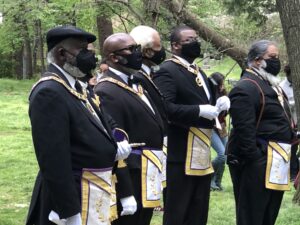Barbie came from Arlington to acknowledge the day with her fellow church volunteers. Mandy showed up because she lives in an apartment building nearby and was always curious about the grounds. And one young mother arrived with her 18-month-old son… to show him where his great great great grandfather was buried.

Every April 16th, DC celebrates Emancipation Day to commemorate Lincoln’s signing of the Compensated Emancipation Act of 1862 that freed 3,100 enslaved individuals in the District of Columbia. This year participants gathered at a libation ceremony and reading of the names of the over three thousand freed people at the Mt. Zion/Female Union Band cemeteries that share a 3-acre plot in Georgetown.
Dating back to the early 1800s, this almost-hidden historic gem next to Georgetown’s Oak Hill Cemetery is one of the oldest black cemeteries in Washington, DC. And this is where many of the freed, enslaved, and emancipated were buried.
At an Emancipation Day ceremony that involved a procession, libations (non-denominational prayers using water), songs, poems, and other ways to honor and celebrate ancestors in this sacred burial ground that also served as a stop on the Underground Railroad, participants were also encouraged to keep the memory of these ancestors alive by sharing their stories.

Neville Waters, a sixth-generation Washingtonian, identified his ancestors’ final resting place and brought Emancipation Day full circle with a reminder that DC’s Emancipation Day was different than many others, not only did it happen here before most other enslaved people were emancipated, but DC was one of the only places where slave owners were compensated.
“April 16th has remained a special day in the hearts of Black residents. I can speak particularly to my own legacy,” Waters shared. “My great-great grandfather was freed… when he was six years old.”

![[Vid] A First Look Inside Nats Ballpark for the 2024 Season](http://kstreetmagazine.com/wp-content/uploads/2024/03/EEB50F04-B719-4F75-B5C2-478029C3230B_1_105_c-176x133.jpeg)


